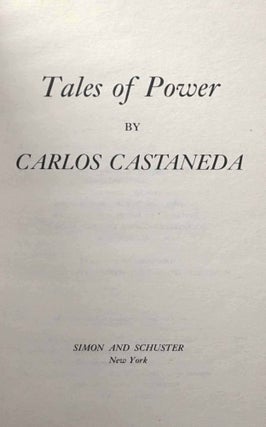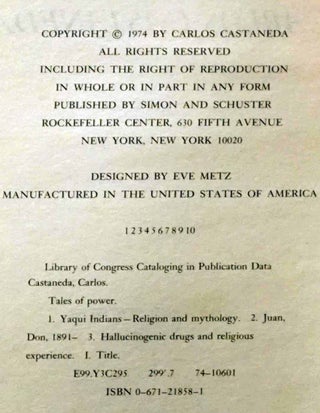Tales of Power
New York, NY: Simon & Schuster, 1974. First Edition. Hardcover. Simultaneously lauded and derided, the controversial Carlos Castaneda is known for the series of four books which he claims describe his training in shamanism by “Don Juan Matus,” a Yaqui Indian “sorcerer” who has never been proven to exist. Though we are now removed by some decades from the scholarly controversy which engulfed this work, it is worth revisiting because in recent years, younger people—allured by the prospect of ancient wisdom and witchcraft—have given Castaneda new consideration. Anthropologist Edward H. Spicer, in reviewing Castaneda’s claims, wrote that descriptions of events in his work were not consistent with Yacqui cultural practices, and as such, it is doubtful that Castaneda or the mythical Don Juan ever participated in Yacqui group life. Others, such as the celebrated, pioneering psychedelic drug researcher R. Gordon Wasson, praised Castaneda and his work. Castaneda claimed that, upon finishing has apprenticeship to Don Juan Matus, he was recognized as “the new nagual,” the new leader of “a party of seers of his lineage.” By virtue of this crowning, he claimed that—for his own “party of seers,” he could be a connection to “that unknown,” “unknown but yet still reachable by man.” He called this unknown realm “non-ordinary reality.” Studies of psychopathy have shown that psychopaths often employ the use of “pseudo-realities,” in which the pseudo-realist posits the argument that, what you think is reality is actually not reality, and once you are “taught” to “see,” you will see that “what you think is reality isn’t actually reality” (and start working on behalf of the pseudo-realist [the cultist]; by necessity acting in such a way as to uphold the pseudo-reality. This is often realized in costly personal sacrifices on behalf of the initiate—including isolation from friends and family. With Castaneda and his circle (he lived with three women whom he called “Fellow Travelers of Awareness”), this meant embracing “a principle of freedom from personal history.” Removing oneself from society, one’s family and one's past thus becomes “a principle of freedom from personal history.” This is not only a midlevel cult indoctrination path, but an impressive cult-inducing reframe if there ever was one. In the 1990s, Castaneda founded what was basically a church—promoting a religion of “Tensegrity,” which was predictably described in its promotional materials as “the modernized version of some movements called magical passes developed by Indian shamans who lived in Mexico in times prior to the Spanish Conquest.” Castaneda, along with Carol Tiggs, Florinda Donner-Grau and Taisha Abelar, created “Cleargreen Incorporated” in 1995, which sold seminars, books, and merchandise. Was Castaneda a bona-fide anthropologist who was genuinely trying to share with the world some secret, magical knowledge he felt could benefit mankind? Or was he nothing more than a rarefied cultist, a neo-mystical polygamist? Regardless of these considerations of person and factuality, it is inarguable that Castaneda was a powerful composer of prose who wrote convincingly. The dust has settled, but it is doubtful that we will ever get the full story on Don Juan Matus, Castaneda, or his “Tales of Power.” [ISBN: 0-671-21858-1]. Hardcover in unclipped dust-jacket: the First Edition of this much-contested cult classic, though not explicated as such on copyright page; First Printing, as indicated by number sequence thereon. Book in strong near fine condition with only minor-to-moderate shelf-wear, bumping to fine-edges & corners of front, back covers & spine; slight age-toning, discoloration of boards & minor rubbing to/along same; text and interior remarkably clean—entirely without highlighting, annotation or anything of the sort. Dust-jacket in near fine condition with moderate-to-pronounced shelf-wear, bumping, chipping to fine-edges & corners of front, back covers & spine; vertical reader’s crease running along leftmost fine-edge of front cover, reflective of having been read by previous owner; slight staining, discoloration to fine-edges of front and rear flaps, at interior; a few exhibits of bumping & bump-creasing to same. Near Fine / Near Fine. [Item #5169]
Price: $60.00


![[Item #5169] Tales of Power. Carlos Castaneda.](https://thirdmindbooks.cdn.bibliopolis.com/pictures/5169.jpg?width=768&height=1000&fit=bounds&auto=webp&v=1667595361)




